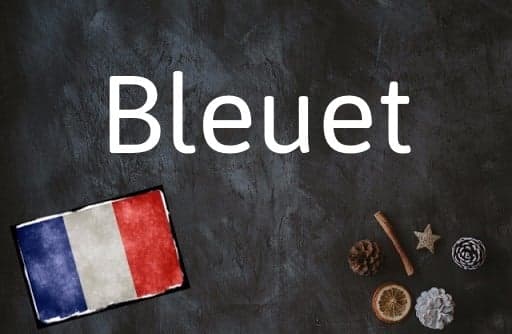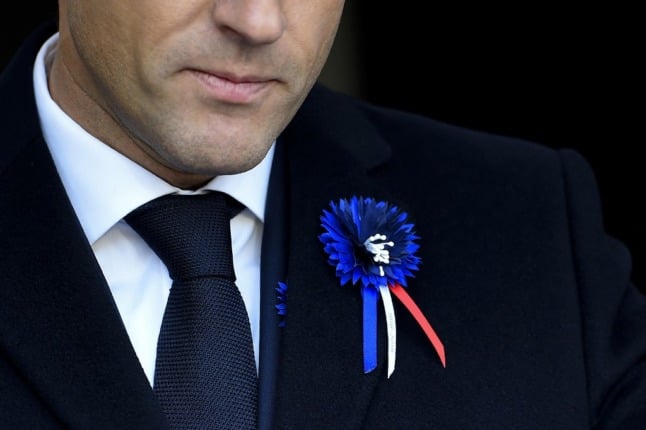French word of the Day: Bleuet

This is one of two flowers in France that are associated with public holidays.
Why do I need to know bleuet?
Because it's a symbolic flower that is very important on two dates of the year - May 8th and November 11th.
What does it mean?
Un bleuet is the small blue flower known in English as a cornflower. It's a common and rather pretty wildflower often seen on grass verges and in gardens.
But in France it has a greater significance as it is also the official flower of remembrance, so you will see people sporting them in their buttonholes on the two public holidays associated with remembrance; May 8th which marks VE Day and November 11th which marks Armistice Day.
They're more widely worn on November 11th, but you will see some people also wearing them on May 8th.

French President Emmanuel Macron wears a bleuet badge. Photo by JEAN-CHRISTOPHE VERHAEGEN / AFP
The wearing of a remembrance flower is not as widespread in France as it is in the UK, where the poppy (le coquelicot) is the symbol of choice and is seen on everyone from politicians to TV newsreaders during the first couple of weeks in November.
But you will certainly see people wearing them at official Armistice Day or VE Day parades and wreath-laying, and you may see bleuet sellers on the streets or online, particularly in November. Proceeds go to armed forces charities.
Use it like this
Le Président de la République portait-il un bleuet ? Bien sûr - Was the president wearing a cornflower? Of course
Le bleuet a été choisi parce qu'il était l'une des seules à pousser sur les champs de batailles, mais aussi car elle rappelle les uniformes bleus des soldats français - The cornflower was chosen because it was one of the only flowers to grown on the battlefields, but also because it recalls the blue uniforms
You can contribute to Le Bleuet de France appeal and buy official merchandise on their website here.
PS The other French public holiday to have its own flower is May 1st with the muguet.
Comments
See Also
Why do I need to know bleuet?
Because it's a symbolic flower that is very important on two dates of the year - May 8th and November 11th.
What does it mean?
Un bleuet is the small blue flower known in English as a cornflower. It's a common and rather pretty wildflower often seen on grass verges and in gardens.
But in France it has a greater significance as it is also the official flower of remembrance, so you will see people sporting them in their buttonholes on the two public holidays associated with remembrance; May 8th which marks VE Day and November 11th which marks Armistice Day.
They're more widely worn on November 11th, but you will see some people also wearing them on May 8th.

The wearing of a remembrance flower is not as widespread in France as it is in the UK, where the poppy (le coquelicot) is the symbol of choice and is seen on everyone from politicians to TV newsreaders during the first couple of weeks in November.
But you will certainly see people wearing them at official Armistice Day or VE Day parades and wreath-laying, and you may see bleuet sellers on the streets or online, particularly in November. Proceeds go to armed forces charities.
Use it like this
Le Président de la République portait-il un bleuet ? Bien sûr - Was the president wearing a cornflower? Of course
Le bleuet a été choisi parce qu'il était l'une des seules à pousser sur les champs de batailles, mais aussi car elle rappelle les uniformes bleus des soldats français - The cornflower was chosen because it was one of the only flowers to grown on the battlefields, but also because it recalls the blue uniforms
You can contribute to Le Bleuet de France appeal and buy official merchandise on their website here.
PS The other French public holiday to have its own flower is May 1st with the muguet.
Join the conversation in our comments section below. Share your own views and experience and if you have a question or suggestion for our journalists then email us at [email protected].
Please keep comments civil, constructive and on topic – and make sure to read our terms of use before getting involved.
Please log in here to leave a comment.